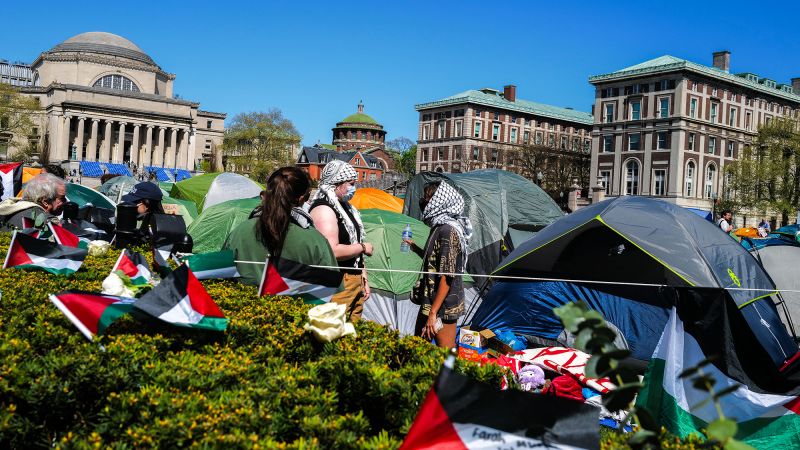Columbia University student organizers were given a midnight deadline to resolve talks with the university over dismantling a pro-Palestinian encampment that has led to days of turmoil on campus. Despite ongoing negotiations, the university president stated that alternative options would be considered if no agreement was reached by the deadline. The possibility of calling in police to clear the encampment has been supported by some donors and lawmakers, while others have condemned the decision to involve law enforcement in similar situations in the past.
The encampment on the Columbia University campus has sparked safety concerns and led to disruptions in campus life. With tensions high, especially during the Passover holiday, Jewish students have expressed fear and unease as the situation unfolds. The encampment, which consists of over 80 tents, has drawn national attention, with elected officials at various levels commenting on the situation, including plans for visits and press conferences addressing concerns related to antisemitism.
Similar protests and encampments in solidarity with Gaza have emerged at other universities across the United States, leading to arrests and disciplinary actions. Campuses like New York University, Yale University, and the University of Minnesota have seen protests escalate, resulting in confrontations with law enforcement and administrative actions. The protests have drawn attention to the ongoing Israeli-Palestinian conflict and have raised concerns about free speech, safety, and community stability on college campuses.
Columbia University students have stated that they will not leave the encampment until their demands are met, which include calls for divestment from Israel-related investments, financial transparency, and amnesty for participating students. The university has warned that the encampment violates school rules, but specific disciplinary consequences have not been outlined. City officials have identified outside agitators contributing to the unrest and disruptions at the campuses involved in the protests.
The protests at Columbia University have been marked by a mix of Jewish and non-Jewish students participating in activities like Passover celebrations and discussions about campus activism. While some students see the encampment as a symbol of perseverance and resilience, others have opted to leave campus due to safety concerns. Lawmakers and the White House have taken note of the protests, acknowledging the rights of individuals to peacefully protest while denouncing violence and antisemitic rhetoric. Efforts to combat antisemitism and promote tolerance are framed as American issues that cross party lines.
Overall, the protests at Columbia University and other campuses reflect a broader conversation about free speech, activism, safety, and diversity within academic communities. The response to the protests has sparked debates about the appropriate handling of demonstrations on campus, the balance between various rights and responsibilities, and the impact of national and international conflicts on college environments. As the situation continues to evolve, the focus remains on finding resolutions that address the concerns of all stakeholders while upholding principles of peace, dialogue, and mutual understanding.


